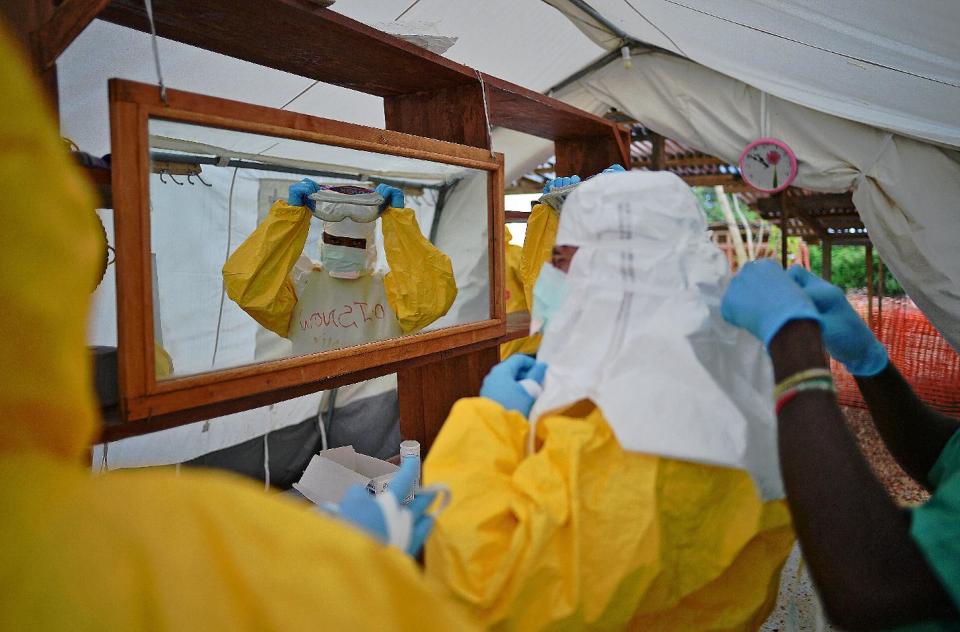World Health Organization Ebola Response
"Time will come for investigation. Right now we have to focus on the response."
"When we scaled up, the beginning of the outbreak was very comparable to what we had seen elsewhere in Africa. And then, by June, it became something different."
"We indicated that this outbreak was different. I'm afraid we probably didn't say it loud enough for the world to understand what we were saying and for all the international community to be mobilised."
Isabelle Nuttall, head of global response and alert, World Health Organization, Geneva
 The World Health Organization is ramping up efforts to stop Ebola from spreading elsewhere in Africa
The World Health Organization is ramping up efforts to stop Ebola from spreading elsewhere in Africa "I was not fully informed of the evolution of the outbreak. We responded, but our response may not have matched the scale of the outbreak and the complexity of the outbreak."
WHO director general, Margaret Chan
"We are putting in place the foundations of a very powerful response"
"I am absolutely certain that when we look at the history, that this effort that has been put in place will have been shown to have had an impact, though I will accept that we probably won't see a reduction in the outbreak curve until the end of the year."
David Nabarro, United Nations Ebola Coordinator
Since April, Doctors Without Borders has been on the ground treating the ill suffering from the dread effects of Ebola, from the outset. They've long had familiarity with such outbreaks and the requirement to respond swiftly and put them to an end. They were alarmed by the spread of the most recent outbreak and the weak response to what looked to them to be becoming a real problem. And they began to warn that the global response to the Ebola outbreak was inadequate.
"Leaders are failing to come to grips with this transnational threat", MSF international president Joanne Liu cautioned at a UN briefing. "We are in uncharted waters." The trouble was the warning really was falling on deaf ears. The World Health Organization simply wasn't responding in a manner adequate to the perceived danger. Margaret Chan claimed to have been "very unhappy" in late June when she realized the scope of the health crisis outlined in a memo describing her local team's deficiencies.
Now the blame is being placed on poor communication, a lack of leadership and underfunding. All of which conspired to permit the disease to spiral out of control thanks to the World Health Organization's initial weak response to the Ebola outbreak. The WHO director general took personal command at that point in June to initiate moves to replace the heads of offices in Guinea, Liberia and Sierra Leone, and at the same time upgrade the emergency to the top level.
Since that time the situation has only become exacerbated, the spread of the virus even more alarming, and particularly so with the swath it was cutting in the already-short-handed numbers of local health practitioners. Nurses and doctors were contracting Ebola from the overload of patients they were caring for, and dying. All of this occurring though there was no lack of warning. In April Doctors Without Borders warned the outbreak was "unprecedented". Even while the WHO felt the contagion was under control.
Toward the end of June, WHO's top Ebola expert, Pierre Formenty, finally produced a presentation to a steering committee of the Global Outbreak Alert & Response Network, with charts indicating that the outbreak in Sierra Leone, Liberia and Guinea were swamping the capacity to respond. New infections were doubling every 24 days. By August, the tally had eclipsed the case total reported in the previous 24 Ebola outbreaks all combined. Nine thousand cases are now expected to emerge as of this week.
According to an October 8 report in the Lancet medical journal, the WHO's response capacity was weakened and eroded in the wake of budget cuts. And a report in the British Medical Journal added that donors' contributions declined to 25% of the WHO's revenue in 2010 - 2011 from 80 percent in 1978 -1979. But the larger problem appears to be bureaucratic complacency and an unwillingness to listen to the experts in the field.
Labels: Bioscience, Catastrophe, Chaos, Ebola, Medicine, West Africa, WHO


0 Comments:
Post a Comment
<< Home